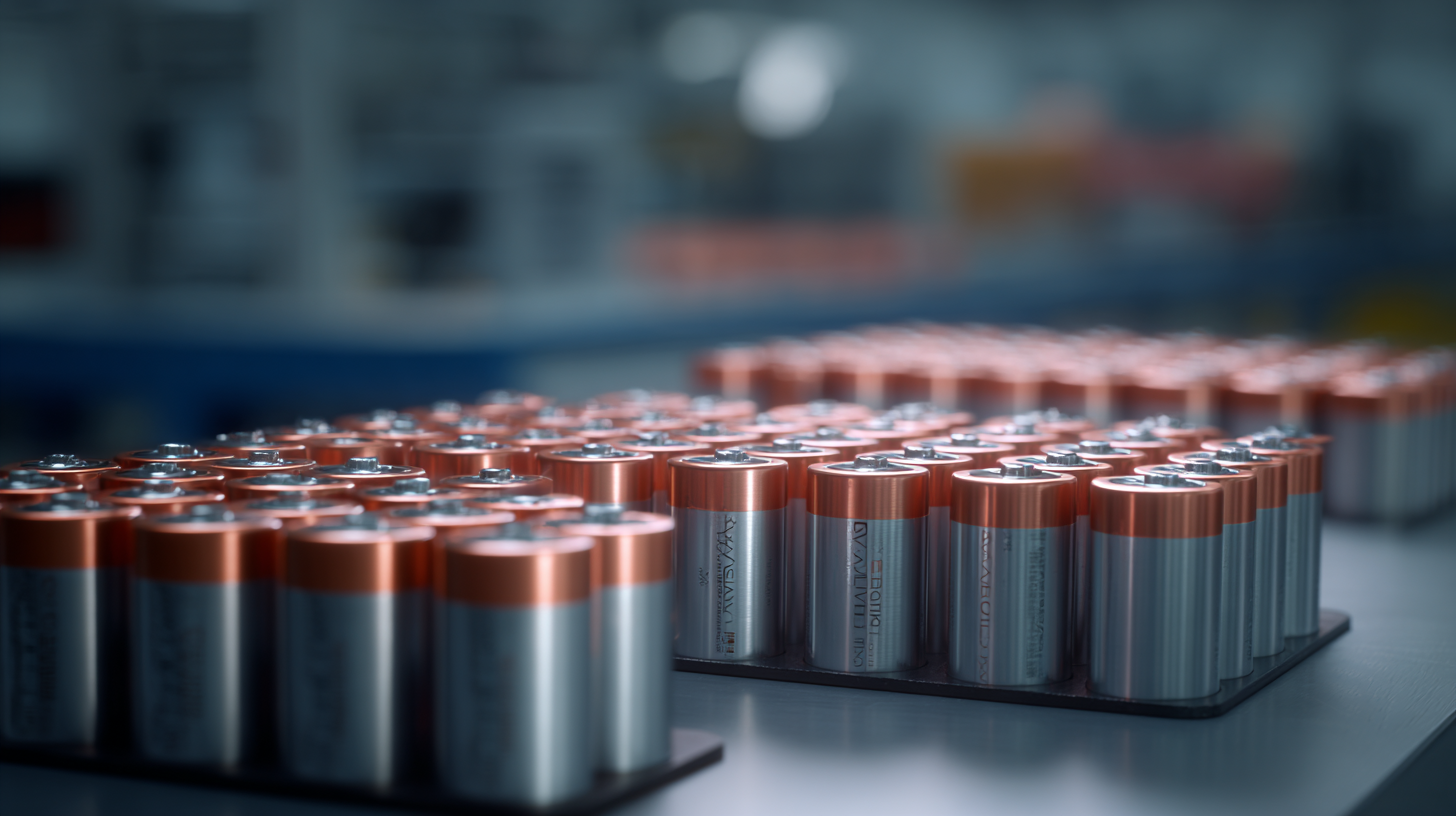The lithium battery market has experienced exponential growth in recent years, driven by the increasing demand for sustainable energy solutions. According to a report by the International Energy Agency, the global lithium battery market is expected to reach $129 billion by 2027, reflecting a CAGR of 20.7%. However, this rapid expansion is not without its challenges. Issues such as inconsistent production standards, supply chain disruptions, and environmental concerns pose significant obstacles for manufacturers and consumers alike.

As global buyers seek reliable and sustainable lithium battery solutions, it is essential to address these industrial production standards and technical problems that can hinder progress. By fostering collaboration and innovation, we can empower buyers with the best solutions that not only meet their energy needs but also contribute to a sustainable future.
Lithium batteries play a crucial role in the transition towards sustainable energy, particularly as global demand for efficient and reliable energy storage solutions surges. However, navigating the landscape of lithium battery manufacturing standards can be complex. Different countries and organizations have developed various regulations and guidelines to ensure safety, efficiency, and environmental responsibility in the production and disposal of these batteries. Understanding these standards is essential for global buyers seeking the best lithium battery solutions.
For instance, the International Electrotechnical Commission (IEC) and the Society of Automotive Engineers (SAE) have set forth comprehensive standards that govern battery performance and safety. Adherence to these standards not only ensures compliance with legal requirements but also enhances the credibility of manufacturers. Furthermore, buyers must consider certification marks, such as UL and CE, which signify that a product has undergone rigorous testing. By prioritizing manufacturers that adhere to recognized industry standards, buyers can ensure they invest in lithium battery solutions that not only fulfill their energy needs but also uphold sustainability goals.

The lithium battery market is witnessing unprecedented growth, projected to reach $51.57 billion in 2023, with a compound annual growth rate (CAGR) of 21.74% from 2024 to 2031. This surge is driven by the increasing demand for sustainable energy solutions across various sectors, including automotive, industrial, and consumer electronics. Key types of lithium batteries, such as lithium-ion and lithium iron phosphate (LiFePO4), play crucial roles in energy storage for renewable sources, electric vehicles, and portable power solutions.
As the emphasis on renewable energy intensifies, the long-duration energy storage market is gaining traction, supported by advancements in lithium battery technology. For instance, the global market for lithium-ion battery recycling is set to expand significantly, from $13.93 billion in 2023 to an estimated $53.4 billion by 2032, highlighting the importance of battery life cycle management in sustainable energy transition. With military applications also on the rise, expected to reach $3.1 billion by 2033, lithium batteries are becoming integral to both civilian and defense energy strategies, ensuring a stable and efficient energy future.

Understanding compliance with industry standards is crucial for the safety and quality of lithium batteries. As the demand for sustainable energy solutions grows, so does the need for reliable lithium battery systems. According to the International Energy Agency (IEA), the global market for lithium-ion batteries is expected to reach $120 billion by 2030, driven primarily by electric vehicles and renewable energy storage. Compliance with standards such as IEC 62133 and UL 1973 ensures that batteries meet safety, performance, and environmental requirements, ultimately safeguarding consumers and manufacturers alike.
Tips for buyers: Always verify if your battery supplier adheres to international standards and certifications. This not only protects your investment but also enhances the overall safety and efficiency of your energy systems. Moreover, consider the manufacturer's testing data—industry reports indicate that batteries that comply with the latest standards can reduce failure rates by up to 25%, thereby increasing overall reliability.
With sustainable energy driving innovation, it is essential for buyers to engage with suppliers that prioritize compliance. When selecting lithium batteries, scrutinize the quality assurance processes along with third-party testing results. Remember, batteries that pass stringent quality tests tend to provide enhanced performance and longevity, which can significantly lower long-term operational costs. Emphasizing compliance will empower you to make informed decisions, ensuring a robust and sustainable energy solution.
This chart illustrates the compliance of various lithium battery models with industry standards for safety and quality, showcasing the number of models that meet different certification requirements.
Innovation plays a crucial role in the advancement of lithium battery solutions, particularly in the context of global markets seeking sustainable energy alternatives. As industries and consumers alike pivot towards greener options, the demand for efficient, high-performing lithium batteries has skyrocketed. This presents a unique opportunity for innovators and manufacturers to push the boundaries of technology, leading to the development of batteries that not only last longer but also charge more quickly and are more environmentally friendly.
Incorporating cutting-edge materials and novel manufacturing techniques, the latest lithium battery solutions promise to enhance energy density and lifecycle performance. Research into solid-state batteries, for example, represents a significant leap forward, addressing safety concerns while improving efficiency. Furthermore, the integration of smart technology enables real-time monitoring of battery health, optimization of performance, and even predictive maintenance, ensuring that consumers remain informed and empowered in their energy choices. As innovation continues to drive the evolution of lithium battery solutions, global buyers will find themselves at the forefront of a sustainable energy revolution.
| Battery Type | Energy Density (Wh/kg) | Cycle Life (Cycles) | Charging Time (Hours) | Applications |
|---|---|---|---|---|
| Lithium Iron Phosphate (LiFePO4) | 90-120 | 2000-5000 | 4-6 | Electric Vehicles, Energy Storage |
| Lithium Nickel Cobalt Aluminum Oxide (NCA) | 150-200 | 1000-2000 | 1-2 | Electric Vehicles, Drones |
| Lithium Manganese Oxide (LMO) | 100-120 | 2000-3000 | 2-4 | Power Tools, Electric Bikes |
| Lithium Nickel Cobalt Manganese Oxide (NMC) | 150-220 | 1000-2000 | 1-2 | Electric Vehicles, Energy Storage Systems |
The production of lithium batteries plays a critical role in advancing sustainable energy solutions, yet it requires a careful balance between efficiency and eco-friendliness. As the demand for renewable energy storage systems grows, manufacturers are increasingly adopting greener methods of extraction and processing lithium. Techniques such as direct lithium extraction (DLE) present a promising alternative to traditional mining, significantly reducing water usage and minimizing environmental disruption. By prioritizing sustainable practices, we can help ensure that lithium battery production does not contribute to the degradation of our planet.
Moreover, the lifecycle of lithium batteries can be optimized by integrating recycling processes that reclaim valuable materials for reuse. Implementing closed-loop systems not only conserves resources but also reduces the carbon footprint associated with producing new batteries. This shift toward circular economy principles is vital for achieving long-term sustainability in the lithium battery sector.
Ultimately, by emphasizing eco-friendly practices throughout the production chain, from raw material sourcing to end-of-life disposal, we can empower global buyers to choose solutions that align with their sustainability goals while supporting the growth of clean energy technologies.


